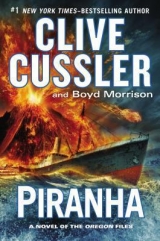
Текст книги "Piranha"
Автор книги: Clive Cussler
Жанр:
Политические детективы
сообщить о нарушении
Текущая страница: 19 (всего у книги 25 страниц)

Berlin
Juan followed the footprints around the building, where they disappeared under an elevated train platform. At the far end he caught sight of Bazin’s silhouette as he approached a parked Mercedes SUV. He jumped in, started it up, and sped directly toward Juan.
Juan put two shots into the windshield before he had to roll out of the way. Neither bullet hit Bazin. Juan ran for the Audi.
Eric had successfully threaded his way through the students milling outside and was just arriving at the Audi wagon. Juan pointed at the SUV rocketing away. “Bazin’s getting away! Get in.”
The keyless entry chirped and Juan fired up the engine, dropping it into gear even before Eric had the door closed. The tires bit into the snow, Juan scraping the car in front of them with a screech of metal in his haste to get out of the parking spot.
The Mercedes skidded around the corner and out of sight. Juan stood on the accelerator. The Audi spun all four wheels as it scrabbled for purchase on the slick road.
The Mercedes was heavier and had better traction, but the lighter Audi had the advantage of four-wheel drive. Juan closed within half a block before the Mercedes started taking a series of hard turns in an effort to lose them.
Even though the traffic was light, there were still plenty of cars to weave around. The Mercedes bounced off a Volvo as it overtook it, sending the sedan spinning into the path of the Audi. Juan wrenched the wheel around to avoid T-boning the screaming driver.
“He’s going to kill someone if we don’t stop him,” Eric said.
“Working on it,” Juan replied through gritted teeth.
They rounded another corner, the Mercedes banking off parked cars, and Juan put the Audi into a four-wheel drift like a rally car driver to make up the rest of the distance. He nosed the front of the Audi against the SUV’s right rear fender and yanked the steering wheel to the left. The Mercedes skidded sideways, but it had enough power driving the rear wheels to keep from spinning out.
The Audi lost contact and Juan had to steady the wheel to keep it from careening into a light post. The Mercedes pulled a couple of car lengths ahead of them.
Juan had to put an end to the chase one way or another. He unrolled his window, drew the Colt, and aimed at the SUV’s rear tire. He squeezed off three rounds. The third connected and the tire blew out.
The exposed rim bit into the snow, making the back end of the Mercedes fishtail back and forth. As Juan brought his arm back inside the window, the Audi hit a patch of ice and he had to slow considerably to regain control. The Mercedes was half a block in front, so he stomped the accelerator to catch up.
Bazin was approaching a red light, but he showed no signs of slowing. A yellow street tram approached on the cross street from the left. While the city’s trams rode on steel rails embedded in the pavement, their seven cars were much more massive than a bus and took longer to slow down, especially on rails made more slippery by the snow and ice.
Bazin accelerated in an attempt to make it through the intersection before the tram got there. The three good tires churned at the snow, but the rim spun uselessly, slowing the SUV.
He didn’t make it.
The tram slammed into the rear half of the SUV, missing the driver’s door by mere inches. The Mercedes was crushed and then flew into the air in a neat pirouette. The tram barely shuddered from the impact.
Juan didn’t want to suffer the same fate. He twisted the wheel to the left and feathered the gas pedal to maintain contact with the road. With the benefit of grip from all four tires, the Audi was able to maneuver across the intersection behind the slowing tram with millimeters to spare. Juan hit the brakes and the antilock system chattered as it strained to halt the car as it headed in the direction of a bridge over the Spree River, Berlin’s main waterway.
The skewed angle across the road and the extra speed carried the Audi over an embankment and into a park leading down to the river beside the bridge. The snow on the hill was even deeper, and if the car stopped, Juan would never get it going again without a tow. He took his foot off the brake and accelerated left, risking a plunge into the icy river.
After zigzagging across the park, he crashed through a chain barrier and onto a road. He headed back to the scene of the accident.
His route had taken Juan all the way around the block. He came up behind the now stopped tram, which was surrounded by a snarl of vehicles that didn’t allow Juan to get closer than half a block away before he had to stop as well.
He threw open the door and jumped out, running toward the scene of the accident. The tram’s passengers had already filed off at the behest of the driver, who was helping Bazin out of his wrecked vehicle. Even from this distance, Juan could see that every air bag had inflated, sparing him any serious injury.
Bazin pushed the tram driver away and stumbled from the wreckage. He searched the crowd until he locked eyes with Juan, then scanned the traffic jam around him before settling on the tram itself. He ducked his head to use the milling passengers for cover and ran inside. The tram started moving despite howls of protest from the driver, who tried to get back on before the doors shut in his face.
Juan ran alongside the accelerating tram and shot the glass door at its tail end three times, shattering it. He pocketed the gun and latched on with both hands as his feet hit an ice patch. He slipped and was dragged along by the tram, the remnants of the broken safety glass digging into the flesh of his palms.
With all his strength, Juan heaved himself through the gaping hole where the door had been. As soon as he hit the floor, bullets ricocheted off the wall by his head. He took cover behind the nearest seat and returned fire, but Bazin was concealed too well in the driver’s cockpit. Juan tried pulling the emergency brake above the door, but Bazin overrode the signal.
Bazin leaned out from the cockpit and took a couple of more shots. Juan did the same with his last two rounds, narrowly missing Bazin’s head. Once again, Bazin poked his head out, but the slide on his pistol was locked back, indicating he, too, was empty.
At that point, Bazin placed what looked like the driver’s bag on the deadman brake pedal, the safety device that was supposed to stop the train if the driver became incapacitated. Though Bazin left the cockpit, the uncontrolled tram continued racing along the streets, bashing any vehicle in its path. Bazin took the cockpit’s fire extinguisher, went to the closest passenger window, and smashed the extinguisher against the glass. He was going to climb out, leaving Juan on the runaway tram and heading directly for a broad T intersection at full speed. If it didn’t stop before it hit the curve in the track, the tram would derail as it took the corner and plow through the front lobby of an office building at forty miles an hour.
Juan charged forward and threw himself at Bazin, catching the mercenary’s arm before he could tumble out. Bazin teetered on the edge.
“Not before I get this,” Juan said, and plunged his hand into Bazin’s coat. His fingers grasped the edge of the thesis and he pulled it free.
Except Bazin also grabbed part of the bound document, opening it wide. He leaned out and the weight was too much for Juan to hold with one hand. Bazin fell, still gripping the back half of the thesis, which tore right down the binding, leaving Juan holding the other half.
He watched the nimble Bazin roll through the snow and then spring to his feet before running toward a side street. Juan ran into the cockpit of the tram, kicked the bag off the pedal, and slapped a large red button that he hoped was the emergency stop.
The brakes squealed and the tram lurched and skidded on the rails. It slowed to twenty miles an hour when it reached the curve. It leaned to one side but didn’t derail and then came to a stop halfway through the intersection.
Juan opened the passenger door to see Eric pull up in the Audi.
“Are you okay?” Eric asked as Juan got in.
“I’m fine,” Juan said, disgusted, “but Bazin got away.”
“With the thesis?”
“Half of it.” He showed Eric the ripped document.
“I can start translating that on the plane. Hopefully, it’s still enough to figure out what Kensit has been working on.”
“Let’s get back to the airport before we have the entire Berlin police department asking us questions.”
Eric drove away as the wail of sirens echoed off the buildings.

Martinique
“The sub is one hundred feet from the bow of the Roraima,” Linda said, reading the scan from the passive sonar.
“What about our divers?”
“All recovered in the moon pool,” Hali said. “MacD said he spotted what could have been a corner of the metal photo tin, but his air was exhausted before he could dig it up.”
“What about grabbing it with Little Geek?”
“He said Little Geek won’t fit where he saw it. It was a corner he had to reach his arm into. He said he told Eddie where it was when he passed them on the way up.” The full face masks they were wearing let them communicate up close underwater.
“Where are Eddie and Linc now?” Max asked Murph, who was still operating Little Geek.
“Camera shows them inside the portable underwater habitat,” Murph said. “They should be out of the sub’s view.” The PUH was an inflatable fabric dome that was anchored to the Roraima and contained an air bubble inside to allow the divers who were wearing regulators to rest, converse about the dive, or even get a drink of water.
Max knew curiosity about why they were down there was killing Murph, but he was glad Murph understood enough not to ask questions when he shouldn’t.
The front of the sub was about to pass over the disintegrating Roraima twenty feet above its prow. Max couldn’t wait any longer. It was the closest the sub would get to the Oregon before they started dumping the barrels of explosives.
“Linda, get ready to send a single ping.”
All eyes whipsawed to Max. Linda was shocked by the command. “But Eddie and Linc—”
“Will be safe inside the PUH”—I hope, he thought, but didn’t say. “It’s the only thing I could think of to save the hostages. I’m sorry I couldn’t tell you all before, but if our security has in fact been compromised, I didn’t want any eavesdroppers to know what I was planning.”
Linda nodded her understanding and raised her finger over the button that would activate a sonar ping.
Passive sonar detects submarines underwater using the noise generated by the sub itself. Active sonar sends out sound signals that bounce back to give a picture of the object, much like the clicks dolphins use to find fish. Dolphins are also thought to employ these clicking sounds to stun fish. At 220 decibels, their echolocation emanations are among the loudest noises emitted by any animal.
The active ping of the Oregon’s sonar registered at 240 decibels. If a diver were unlucky enough to be swimming next to the transmitter when a ping was sent, his internal organs would be jellied, killing him instantly. The sub was three hundred yards away, so the ping would only stun the divers, as if they had been hit by a flashbang grenade. Eddie and Linc would be protected inside the PUH because their lungs and ears would be above the water level and the sound pressure would be lessened by its transition from water to air. The hostages would be safe for the same reason. Eddie and Linc would have a few minutes to attack the dazed divers on the sub.
That was the plan anyway.
The sub was cruising slowly, likely to make it easier to drop the barrels in a regular pattern along the length of the Roraima.
“Linda,” Max said, “send our surprise.”
The deafening ping blasted forth, audible even in the op center.
“I hope you got the message, guys,” he said under his breath.
–
Eddie and Linc had been discussing why Max was being so cryptic when the ping hit the dome’s fabric so hard that it temporarily caved in. The sound inside the PUH was loud enough to make their ears ring. Eddie couldn’t imagine how loud it would have been in the water.
“That must be the cue Max was talking about,” Linc said.
They quickly donned their masks and drew their SPP-1 underwater pistols. “You take the port side of the sub and I’ll take starboard. We should assume they’re armed as well.” The SPPs couldn’t be reloaded on the fly, so each of them had brought a pair of the pistols that held four bolts each. The disadvantage was that at this depth, the weapons had an effective range of only twenty feet.
They ducked under the surface and emerged from the PUH to see the white sub gliding fifty feet above them. Through the Roraima’s remaining intact girders, Eddie could make out the silhouette of a scuba diver thrashing from the effects of the sonar disruption.
An object was tumbling down toward them. It looked unsettlingly like a depth charge, which meant it had to be one of the barrels that Max had mentioned. It crashed into a rusted girder, which collapsed and sent a pile of metal down with it. The tangle of steel landed on the barrel. It was only twenty feet from the location where MacD said he had spotted the object he thought might be the corner of the tin holding the photographic plates they were looking for.
There was no time to search for it now. Their priority was to eliminate the threat from the divers holding the sub passengers hostage. Eddie and Linc pumped their legs to intercept their targets before they regained their senses.
Linc angled away toward the port side of the sub while Eddie swam straight toward the scuba diver, who was still holding his hands to his ears. Blood tinged the water from the man’s ruptured eardrums. He saw Eddie swimming toward him and fumbled with a small speargun that dangled from his wrist, but Eddie shot two bolts into his chest before he could fire. More blood, and the body went limp.
Eddie kicked for the sub, where he saw another barrel teetering over the edge of the stern platform. He caught the bottom of it with his shoulder and pushed it back up before it could fall.
The diver next to the barrel, who had been struggling to wrestle it over the side in his diminished state, was shocked by Eddie’s sudden appearance. He reeled backward and managed to get his finger on the trigger of his speargun just as Eddie’s bolt lanced through his mask. His spear fired harmlessly into the pontoon.
Eddie checked the diver and saw that his mask was outfitted with a bone-conduction communications device. Even with a ruptured eardrum, the man would still be able to hear a signal transmitted from another diver. Eddie had to assume all of the divers were similarly equipped.
He turned and spotted a third diver by the bow. The diver was paying no attention to him but was instead fumbling with a device in his hands. The light from the sub’s interior illuminated him enough for Eddie to see that it was a shaped charge of plastic explosives.
The diver must have gotten the message that they were under attack and was attempting to destroy the sub.
Eddie dolphin-kicked toward him, the SPP-1 outstretched. He fired at thirty feet, but the bolt clanged against the sub’s hull. He dropped the pistol and whipped the spare from his belt. He fired all four bolts in rapid succession, hoping one would hit before the diver could trigger the bomb.
Three of the bolts hit the target, one in the arm and two in the torso, but at this range they lacked the punch needed to disable him. The diver slapped the plastique against the sub and flipped the trigger.
The explosion was small but powerful. It ripped the diver to shreds and knocked Eddie back. He shook his head, and saw that the sub’s hull hadn’t been torn apart. In his haste and disorientation, the diver had placed the charge on an electrical conduit instead of the main body of the hull itself.
The sub was moderately damaged. A huge chunk had been gouged out of the conduit and the hull dented inward. Eddie didn’t see any signs of a leak.
He went to the cockpit dome and knocked on it, startling the pilot. Eddie gave the thumbs-up, the diver’s gesture to surface. The pilot shook his head and started babbling in French. He gesticulated toward the location of the explosion and then back toward the controls. Eddie didn’t have to know the language to understand that the blast had disabled the sub.
He inspected the site of the explosion and found severed wires jutting from the hull. The sub wasn’t going anywhere on its own.
The pilot ran from the cockpit into the sub’s passenger cabin and Eddie swam along outside to follow. The pilot freed a groggy young man from bondage and then went over to the barrel of explosives. Eddie realized with horror that he was about to open it without knowing if it was booby-trapped.
He pounded on the window to get the pilot’s attention. Eddie shook his head vigorously and made an exploding motion with his hands. The pilot got the message and backed off. He came over to the window and pointed to the barrel and then his watch. He flashed five fingers three times.
Eddie nodded. Fifteen minutes left before the barrel exploded.
Linc swam into view. Eddie waved him over and they touched masks.
“I took care of the three on the port side,” Linc said. He saw the damage from the explosion. “That must have been the thump I heard.”
“The sub’s too damaged to move,” Eddie said. “And we’ve got fifteen minutes until that barrel of explosives inside goes off.”
“Which probably means we’ve got fifteen minutes until they all go off, including the one down inside the Roraima.”
“We can’t open the hatch this far down to evacuate the passengers.”
“Even if we could they’d all drown before we could get them up top.”
“Right. You hightail it to the Oregon. We’re going to need help from them to get that sub surfaced.”
“What about you?”
“I’m going to try to get the photo tin before the bomb blows.”
“I’ll be back with the cavalry,” Linc said, and churned his powerful legs toward the Oregon’s moon pool.
Eddie turned back to the window to see the pilot’s pleading face.
“Aidez-nous,” the man said.
Eddie understood that. Help us.
He smiled and circled his thumb and forefinger in the OK sign. Help is on the way.
Then he swam back down into the depths of the Roraima.
–
As Linc swift-kicked toward the Oregon, Max and the rest of the crew in the op center watched him on the big screen via the underwater camera lowered from the moon pool. Linc hadn’t been down long enough to need a decompression stop so he swam straight up into the pool.
Max had the technician put him on the line before he was even out of the water.
“Where’s Eddie?” Max asked.
“He’s trying to retrieve the photo plate,” Linc said. The view from Little Geek confirmed that Eddie was throwing up clouds of silt digging through the wreck. “But we’ve got a bigger problem. The barrel inside the sub is going to blow in thirteen minutes and the controls have jammed. They’re stuck down there.”
With that little time left, Max didn’t have the luxury of debating the two primary ways of bringing up a submerged vessel: either floating it or pulling it up. It would take precise placement and synchronized inflation of air bags to bring it up without capsizing it. The best choice was to use one of the deck cranes to hoist it. They didn’t have to raise it all the way out of the water, just enough to be able to open the hatch and not drown the occupants.
“Linda,” Max said, “get us over the sub now. Put someone on the number one crane, and divers in the water to attach the cables.” He radioed down instructions to Linc to attach the cables to the sub.
Linda rushed to the helm. There was no anchor to raise. The Oregon had been station-keeping with its thrusters. She nudged the ship over to the Roraima, expertly placing it so the crane’s extended boom was directly over the sub.
Once the divers were in the water with Linc, Max ordered the moon pool doors closed. He didn’t want the sub hostages seeing the unusual configuration as they were raised to the surface.
He wasn’t worried about damaging the sub further. Speed was of the essence. He had a camera lowered with the crane’s hook so that he could monitor what was happening on board. Five minutes later, Linc signaled that the hooks were secure. Max gave the order and the cable spooled up, grew taut, and the sub began to rise. The divers rode up on it except for Linc, who descended out of camera range. At the same time, Max had a lifeboat lowered to take the hostages aboard.
While the sub was coming up, Max checked with Murph, who was watching Eddie’s efforts on Little Geek’s monitor. The cloudy water made it hard to see any progress, but he was still digging.
“What’s that?” Max said when he saw movement at the top of the screen. He thought it might be Linc coming to help Eddie. Instead, it was a piece of steel that must have been dislodged by the falling barrel.
Max went cold. “Warn him!”
“Not enough time,” Murph said, and drove Little Geek forward into the path of the falling debris. Seconds later, the ROV lurched downward and the screen went dark.
Max and Murph looked at each other with dread, but there was nothing more they could do. They had to concentrate on getting the hostages to safety.
“Time?” Max said.
Hali had been keeping track. “We’ve got four minutes left, if the sub’s pilot is accurate.”
The sub’s white pressure vessel broached the surface and the divers were already spinning its hatch open. The hostages, who had been untied by the pilot, hurried out and onto the lifeboat. When all of them had been evacuated, the divers joined them, the last one detaching the crane’s cable before he got in the boat.
Rather than rendezvous with the Oregon, the lifeboat motored away to put as much distance as it could between it and the sub, which continued to float, the barrels filled with explosives lining the pontoons and rear deck.
“Linda, get us out of here.”
Her eyes betrayed the same pain he had felt about leaving Linc and Eddie behind, but he had to put the safety of the ship first. Linda ran the engines up to full thrust and the revolutionary magnetohydronamic power plant accelerated the Oregon faster than any freighter had a right to go. Max watched the sub recede in the distance.
Hali had helpfully superimposed the countdown on the screen. When the timer read zero, they all braced themselves.
Nothing happened. A few more seconds elapsed. Still nothing.
Murph shrugged. “Maybe Kensit’s men aren’t as good at—”
He was interrupted by a huge geyser of flame that shattered the submarine, tossing fragments of metal hundreds of yards in all directions. The boom of the explosion reverberated around the op center two seconds later.
When the echo died down, Murph said, “I guess I spoke too soon.”
“How’s the lifeboat?” Max asked Hali.
“They report that they were pelted by a few pieces of the sub, but no damage or injuries.”
Max nodded. “Linda, turn us around and take us back to the Roraima. Get some more divers ready to look for Eddie and Linc. Have the lifeboat meet us there.”
She brought the Oregon about and headed back for the shipwreck. Only a few pieces of the sub remained on the surface.
As they approached the site of the Roraima, Max spied two heads bobbing in the water. Fearing the worst, he had Murph zoom the camera in.
Where he had expected to see lifeless corpses floating on the waves he instead saw Eddie and Linc waving to the Oregon and smiling. In Eddie’s right hand was a shiny metal box the size of a paperback book. The lifeboat motored over to pick them up.
Max breathed a sigh of relief and patted Murph on the shoulder.
“That was a nice maneuver with Little Geek,” Max said. “That probably saved Eddie’s life.”
Murph exaggeratedly cracked his knuckles. “All in a day’s work.”
“We’ll just dock your partner fee until a new one is paid for.”
Murph laughed until he saw that Max wasn’t joining in. He eyed Max with a serious look and then grinned. “Funny.”
Max winked at Linda and they shared a silent chuckle.
“Max,” Hali said, “I’ve got a call for you from Juan.”
Max went over to the comm station and picked up the handset.
“There’s the mystery man,” Max said. “You’ve missed all the excitement here while you’ve been gallivanting around to who knows where.”
“I know. Hali gave me the highlights.”
“Can you tell me your destination yet?”
“We were in Berlin, and we had a bit of a commotion ourselves.”
“You and Eric all right?”
“We managed to make it to the airport under the radar. If the police come calling, we’ll claim we were innocent bystanders to what happened.”
“Can you tell me what this top secret mission was now?”
“That’s why I’m calling. As we’ve been driving back to the airport, Eric’s been studying the part of a thesis we recovered from the Berlin University library using his phone’s translation app. The thesis was written by Gunther Lutzen, the scientist who was aboard the Roraima. Now that Stoney’s had a chance to get a crude translation of some of the document, he thinks he knows how our security has been compromised.”
“And it’s okay to be discussing this on the phone? Kensit hasn’t cracked our encryption?”
“He doesn’t need to. Eric thinks Kensit has developed a neutrino telescope. At least that’s what Eric is calling it for now.”
Max frowned. He was an accomplished engineer and he’d never heard of such a thing. “How does looking at space help him eavesdrop on our plans?”
“Eric can explain all this better when we get back to the Oregon, but it has nothing to do with space. Lutzen developed revolutionary theories about how to detect subatomic particles. They were decades ahead of their time, and some of the equations in the thesis are so advanced even Stoney is having trouble understanding them. He believes Kensit used those equations to build a device that lets him see anywhere in the world.”
Now Max was really confused. “What do you mean ‘anywhere’?”
“I mean,” Juan said, “with this telescope, he could be looking at you right now and you’d never know it.”








